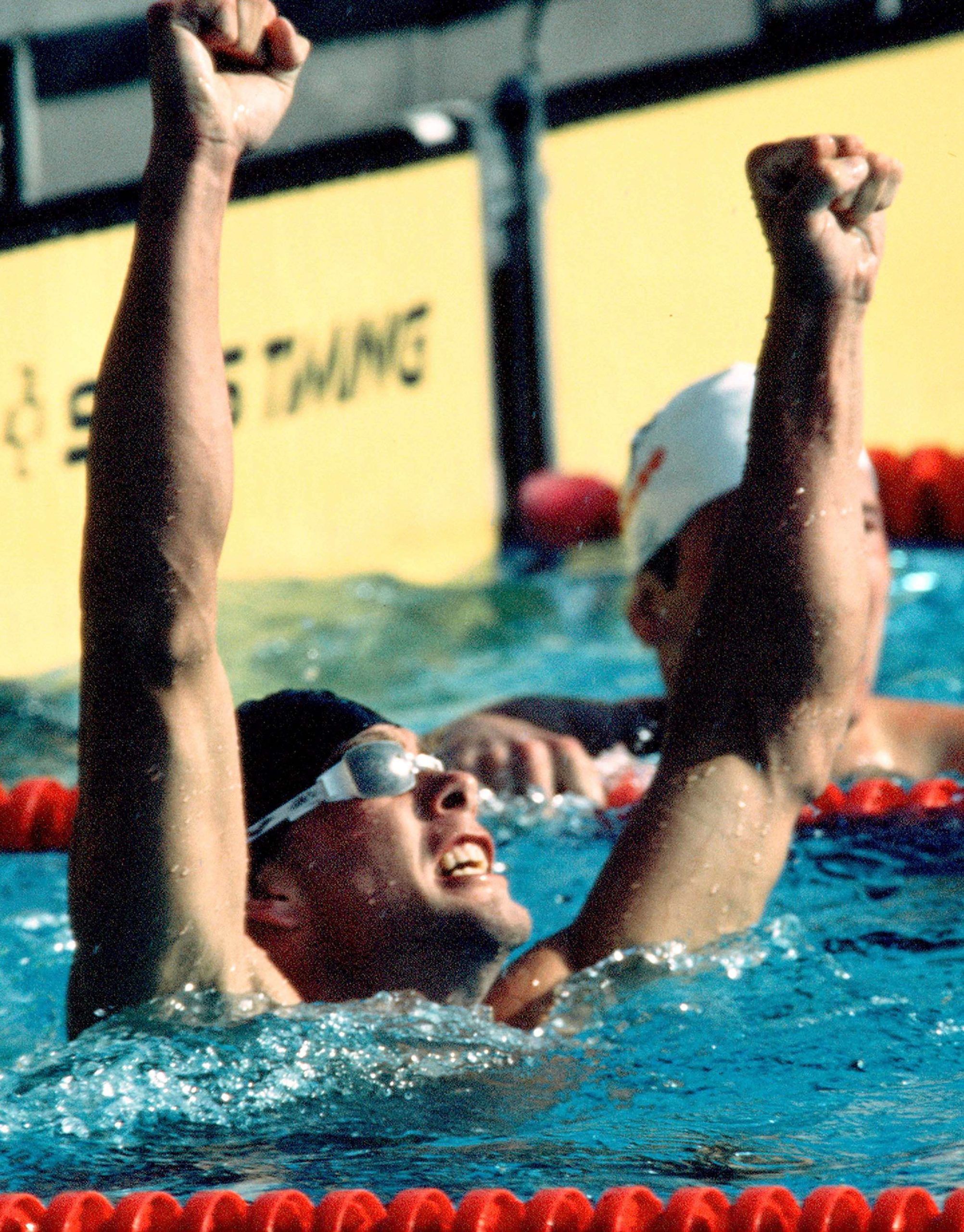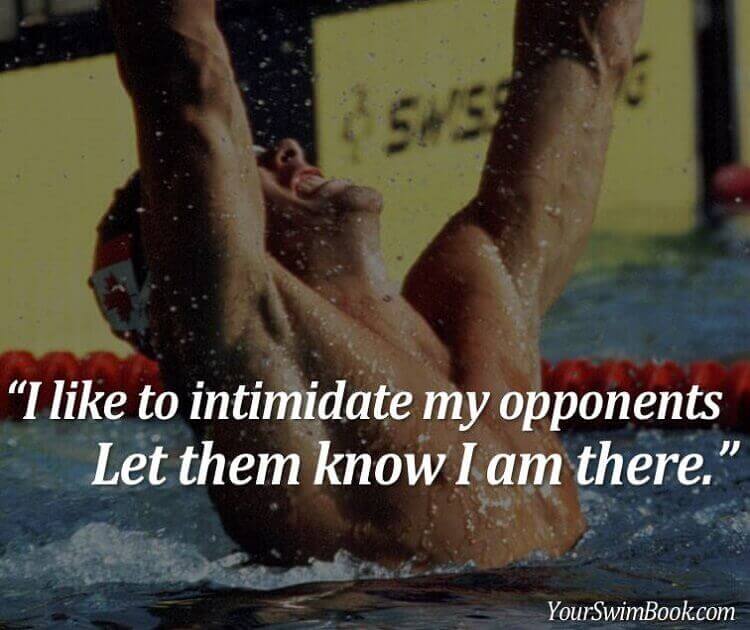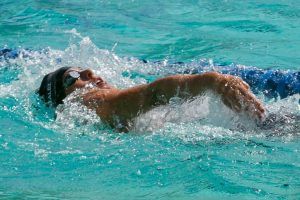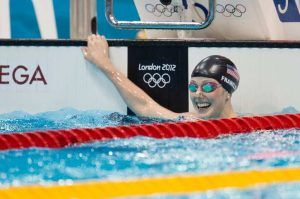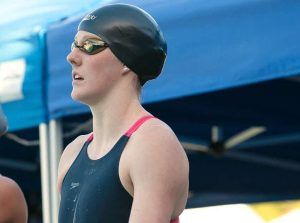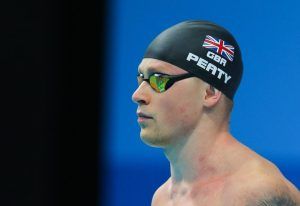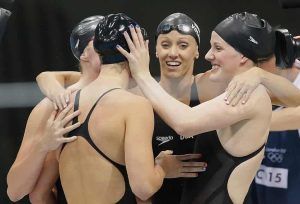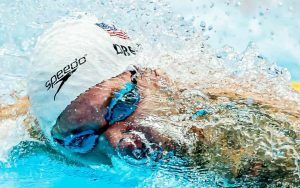The man. The legend. The temper.
For the sport of swimming there are few whose presence and legacy shine larger than that of Victor Davis.
For Canadians, he was not only a champion, but in many ways the representation of a nature that we stereotypically avoid—brash, confidant, and arrogant. He was a champion inside the pool, and completely unapologetic of the fact outside of it.
Those who competed against Davis, in what was essentially the heyday of Canadian swimming on the international stage, remember a fierce competitor whose brief but blinding streak across the swimming consciousness made it impossible to forget the man who lived by his very credo, “Go big or go home.”
World record holder at age 18.
Olympic champion at 20.
Dead at 25.
This is the story of Victor Davis.
Victor Davis: Canadian Swagger
Davis was born in February of 1964 in the Ontario town of Guelph. Raised by his father Mel, who he would be close with throughout his life, young Davis was a bit of a troublemaker, a self-described “derelict”, stealing garden hoses and throwing tomatoes at passing buses.
The combative nature that Davis would display on the pool deck and in the water later in his career were perhaps hereditary; the swimmer’s grandfather had coached the national boxing team at the 1924 Olympics.
Before he could get himself into any serious trouble Davis would find an outlet for his intensity in the sport of swimming, joining up with the local swim team, the Guelph Marlins Aquatic Club at age 12, where he would catch the eye of coach Clifford Barry, who immediately recognized brilliance in the youngster.
“He’s got it,” Barry said. “Whatever it means having it, he’s got it. Victor has that intensity, which a lot of people don’t understand. You don’t understand how much he wants to win.”
Under Barry’s tutelage, Davis would rise the ranks quickly. At the age of 17 he would dethrone another Canadian legend in the sport, Graham Smith, in the 100m breaststroke to win his first national title.
While he had made his introduction to the Canadian swimming community, Davis’ high intensity persona was about to explode out onto the international scene the following year in Ecuador.
Ecuador: 1982 World Championships
On the night of August 5th Davis and the other 7 finalists emerged onto the pool deck on a warm night in Guayaquil. Ecuadorian police toting machine guns lined the entrance to the deck.
Earlier in the meet Davis felt he had squandered an opportunity to win gold in the 100m breaststroke. After posting the fastest time in heats, Davis struggled off the blocks early in the final. Steve Lundquist of the USA, the world record holder at the time, took advantage, and held off a last second charge by Davis, out-touching him by 7 one-hundredths of a second.
“Victor was really upset,” Barry said afterwards. “He felt he should have won that race. For anyone else winning a silver would be a wonderful, wonderful achievement, but Victor, who wants to be nothing but the best in the world, it was a defeat.”
With the memory of the botched opportunity behind him, Davis had refocused on the 200, and was ready to rock.
Behind the blocks Davis dunked his torso and head into the water, emerging like a cobra, spitting venom and water back into the pool. Davis’ routine behind the blocks was nothing short of a production, with shadow boxing, chest slapping, his rippled 6’2 frame pacing angrily back and forth, stalking and snarling at his prey.
“I like to intimidate my opponents, let them know I’m there,” Davis would say.
In the 200 metre breaststroke Davis would not be denied. At the 100m mark he would break away from the field, including the USSR’s Robertas Zhulpa and American John Moffet.
Davis accelerated into the finish, touching in a time of 2:14.77, shaving close to half a second off of the world record. Zhulpa would touch nearly two seconds back for silver.
For Davis, the record breaking was especially sweet. Scotland’s David Wilkie’s mark of 2:15.11 had stood for 6 years, dating back to the Montreal Games. Davis had plastered Wilkie’s name and time on his bedroom wall since childhood on a list of swimmers he wanted to beat.
He was world champion, and now a world record holder.
But in just a couple short months Davis’ name would echo for reasons that had little to do with his swimming prowess, and more to do with that atypical Canadian brashness.
The Enfant Terrible of Swimming
Later that year, Brisbane, Australia hosted the 1982 Commonwealth Games. They were opened by the Duke of Edinburgh, and the closing attended to by The Queen.
The Games feature countries that were once under the umbrella of the British Empire, including Australia, Canada, India, England and just under 70 other countries. It’s a multi-sport competition that is a notable event on the swimming calendar for the countries involved.
Over the course of the swimming events there had been a rash of disqualifications, particularly in the relays.
In the 4x100m medley relay, the Canadians would win handily behind the legs of Davis and fellow superstar Alex Baumann. But immediately it was apparent there was a problem. With the officials conferring, the Canadians stood on the pool deck, wondering what was going on.
Word came down from the officials booth that the third swimmer on the Canadian team, butterflier Dan Thompson, was judged to have left 5/100’s of a second early on the relay exchange.
A Canadian relay team had been disqualified for the third time in the meet. Davis pleaded his case to the marshal, but any hope or interest in reinstating the Canadians fell on deaf ears.
Infuriated, Davis kicked a nearby plastic chair, sending it skidding a dozen feet.
The act itself may have been overlooked if not for the presence of the Queen of England in the pool stands that night.
The Canadian and Australian media were quick to admonish him, with the Montreal Gazette comparing Davis to “a drunk who mistakes a marble fireplace for the indoor plumbing.”
His father had been in Britain at the time of the Games and had purchased a copy of all the major newspapers to see how big of a deal this was becoming. Only, as it turned out, there was barely a mention of the incident.
Regardless of the fact that no one outside of Canada seemed to care about the chair-punt, Davis and his antics had earned him the title of enfant terrible of the proud Canadian swimming program, with Dave Johnson, the head coach of the team that year in Brisbane admitting that Davis had some “growing up to do.”
Trouble would continue to plague Davis over the following year, when in November of 1983 he was charged with aggravated assault following an incident with a 20 year old man who had been at Davis’ shared townhouse in Waterloo. (The case never went to trial and the charges were subsequently dropped.)
Earlier in the year he’d also suffered from mono, lead poisoning, and even incurred a serious mouth infection that had cost him valuable swaths of training time.
Despite his “dryland” activities, training was going well. As preparations continued for the Olympics in Los Angeles the following year, Davis’ confidence didn’t waver.
“I don’t mind losing to someone who is better than me,” Davis said at the beginning of 1984.
“But at this point it’s nobody.”
Los Angeles
A divided world descended on Southern California–with the Russians matching the American boycott four years earlier of their Games–in August of 1984.
For Davis, the meet would feel like deja-vu.
In the 100m breaststroke, just like in Ecuador two years prior, Davis would place second. The 20 year old didn’t hide his disappointment afterward, acknowledging that he was starting to feel some of the strain from high expectations.
“For the first time in my career I felt a lot of pressure,” Davis admitted later in the week.
For the 200m breaststroke the outcome was never in question. He had broken his own world record two months earlier at the Canadian Trials, and was the stand-out favorite to win.
Davis led from the very start and only lengthened his lead with each stroke. It became not a matter of whether he would take gold, but by how much he would beat his own world record.
Davis would thunder into the wall in a time of 2:13.34, dropping another second and a half off of his own world mark, while also putting a halt to the American streak of gold medals (standing at 8 consecutive races until Davis dove in).
He jabbed his fists into a blue Los Angeles sky in victory, and stood proudly on the podium while the Canadian anthem played for him, for his father, his coach, and a grateful nation.
When asked about the race later that night, Davis replied in a way that only Davis could–
“I was hoping to do a 2:12.9. Of course I’m satisfied. For now. Give me a few months, and I won’t be.”
“He Lived Life to the Fullest.”
Life post-swimming was looking rather promising for Victor.
He had hung up his swim suit officially in the summer of 1989. With his energy and presence a wide array of business opportunities had presented themselves.
But all of that came to a shattering halt on a misty night in Montreal.
“Irrepressible,” ran the headline on November 15, 1989.
Davis had been in a coma for several days at a hospital in Montreal, and the toll of a fractured skull, brain hemorrhaging and spinal injuries were too much for even the towering Davis to come back from.
The previous Saturday night he had been at a bar with his girlfriend Donna Clavel and her girlfriend. Before Davis’ arrival words were exchanged with a group of men a table over. Davis and company would leave the bar, and while Davis ran across the street to get a bottle of juice, the men who had been trying to talk to the girls earlier in the bar cat-called to the two women.
When Davis returned, the men, now in their car, were cat-calling at the women. The men would later tell police that Davis threw the juice bottle at their car, cracking the windshield. And the women would testify that the group of men purposely aimed the car at the Olympic champion.
What we do know for sure though is that the driver, Dennis Crossley, pumped the gas, hurtling the car at Davis, hitting him. Unable to get out of the way in time, Davis’ head hit the car, causing brain injuries that he would be unable to recover from.
At just 25, Davis, who had seem invincible in the water and out of it, was dead.
Victor’s Impact on Swimming and Beyond.
Davis continues to live on both literally and physically.
His heart, liver, kidneys and two cornea were donated following his death. No word on whether his intensity or feel for the water were transplanted, however.
And the waves from his swimming continue to ripple to this day in Canadian swimming.
Thirteen recipients of awards from the Victor Davis Memorial Fund made the Canadian Olympic Team in 2008, including multiple Olympic medal winner Ryan Cochrane. In all, nearly 100 swimmers have been awarded bursaries to assist with their training costs.
In a country that reveres it’s winter sporting heroes, hockey in particular, it is uncommon to see a summer sport athlete get much attention, much less 20 years following his death, but Davis has been the exception.
Alex Baumann and him were the subjects of a documentary featuring their training and competition during the early 1980’s called “The Fast & The Furious.”
And Davis was also the subject of a made-for-TV film that was written and stars former swimmer Mark Lutz as the epic breaststroker. In terms of swimming movies, which are by and large awful in terms of accurately reflecting the ins-and-outs of the swimmer lifestyle, Lutz and company’s 2008 film do a great job.
As for Davis, he continues to be remembered fondly by swimmers in Canada—even if one wonders if the memory is fading like all things tend to do—perhaps best with the words he used as his personal motto—“Go big, or go home.”

